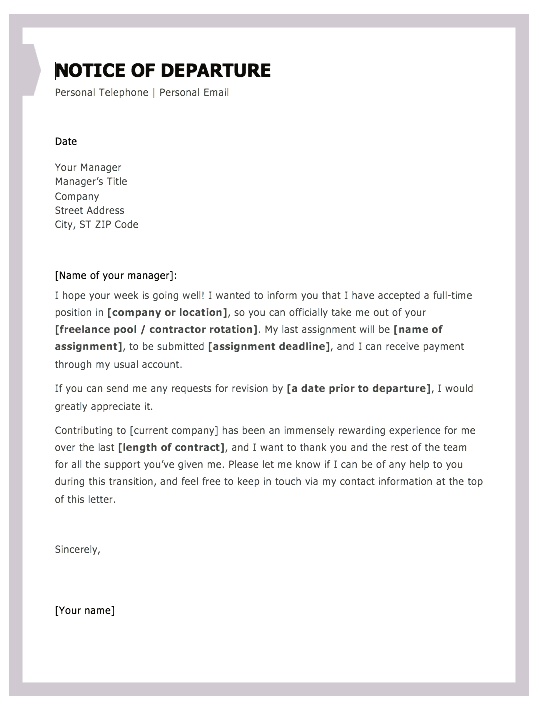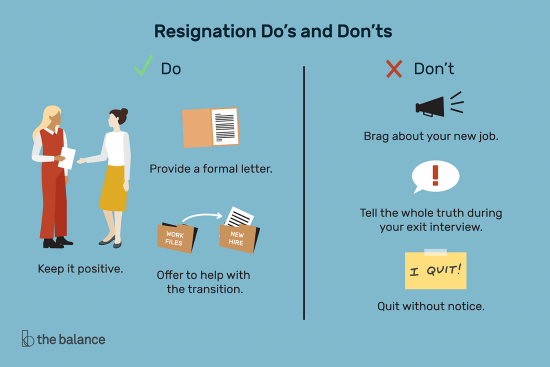How to Write a Professional Resignation Letter – A Complete Guide
Writing a resignation letter may sound straightforward, but it can be challenging if you don’t know its format. In this guide, you will learn different aspects of how to craft this document. Let’s go!
What is a Resignation Letter?
A resignation letter is a document that you use to express your plan of quitting the company where you are working. Note that through this letter, you can officially inform your boss about the exact date of departure and provide them with crucial facts regarding why you are leaving.
What to Include in a Resignation Letter
The following is a highlight of what to include in a resignation letter.
1. Intention to leave
A formal resignation letter is meant to provide your employer with a notice expressing your intention to leave. Usually, where there is no written contract, you can issue your employer with a two-week notice.
Ensure that you clearly state your intention to resign so that your boss may not speculate the reason why you are leaving. The following are some of the strategies you can use to express your intention to leave.
- “Kindly acknowledge receipt of this letter as a notice of resignation from my position as……”
- “It is regrettable to submit my resignation as ……….”
2. Your last day of duty
A resignation letter provides details regarding the employee’s last day of working alongside other details. This disclosure is crucial in easing the transition for the two parties – the employer and the employee.
3. Highlight the reasons for leaving
Stating why you are leaving is essential but not a must. If you are leaving because you are dissatisfied with your employer’s terms of service, you don’t have to talk about that in the resignation letter. However, if your departure is for education, greener pasture, or personal reasons, you can capture it in the letter. Indicating the reasons for your resignation is a way of being courteous to your employer.
4. Offer to help with the transition
Offering to help with the transition is crucial, especially if you are holding a position that would be difficult to fill. For instance, you may volunteer to recruit or train someone to replace you after departure. This is the best way of enhancing respect between you and your employer, particularly after the transition.
5. Thank the employer for the experience
Don’t mention negative things in your resignation. It is vital to highlight the positive experiences you have had at your workplace. Indicate how the role has shaped your career to the extent that you are eligible for a better position.
The following are highlights on how you can thank your employer
- “Thank you very much for all the experience I have acquired from my role.”
- “I am grateful for the support you rendered to me to ensure success in my position.”
6. Finish your letter on a kind note
Ending your letter well shows that you care about the future success of your employer, and you are willing to help them before and after your departure. It is essential to include your contact information in the resignation for the purpose of future communication with your employer.
7. Nice closing
Close your letter by using a warm statement that shows your regard for the company. For instance, you may use phrases, such as “Kind Regards,” or “Yours faithfully,” just before you indicate your name.
How to Write an Email Resignation Notice
Sometimes, a situation may arise that might force you not to resign in a normal way. For instance, if you are far away, resigning through email will be a better option.
The following tips can help you craft an excellent email resignation letter
1. Give notice of two weeks
It is vital to give your employer notice at least two weeks before your day departure. Issuing a notice allows your company to make crucial arrangements regarding your replacement.
2. Use a concise email subject line
Use a simple subject, such as “Resignation,” to enable your employer to recognize the message quickly.
3. Indicate the date you are planning to leave
Ensure that you include the date you are leaving the company to enable them to make adequate plans regarding your replacement.
4. Keep your message clear and concise
Avoid giving an explanation of why you are leaving and what you are going to do. However, you may give a short account if the reason for your departure won’t make your boss feel bitter about it. For example, you may indicate that you are leaving for further studies.
5. Express gratitude
In the email, talk positive things regarding what the company has done for you, but desist from making complaints. You need to do this to maintain a cordial relationship with your boss for your future benefits.
6. Offer to assist
You may suggest helping your employer during the notice period. For instance, you may offer to mentor someone to replace you. Also, if possible, indicate that you will be available to answer questions even after your departure.
7. Ask questions
It is crucial to ask pertinent questions, especially on your final compensation.
8. Offer contact information
If you want to enhance future communication with your employer, it is crucial to provide them with your email address or phone number to contact you in case of anything.
9. Proofread the email
After writing your email, go through it to check typos and grammar errors before you send it. You may ask your colleagues to edit it on your behalf.
What Not to Include in a Resignation Letter
A resignation letter is an official document of communicating your intention to terminate your employment. To compose an excellent letter, you should avoid complaining or critiquing your employer.
When to Give a Resignation Letter to Your Employer
It is advisable to issue your resignation letter in advance before the day of departure. You may give a notice of two weeks or any other period as stipulated in your contract. Also, note that you can resign without giving a notice if circumstances force you to do so.
If you are sharing the workplace with your boss, it is advisable to issue them with a hard copy of the letter. However, if your duty station is away, you can resign through email.
Step by Step Guide of Writing a Resignation Letter
The following are the crucial steps you can follow to craft a resignation letter.
1. Identify yourself
Begin to write your resignation letter by stating your position and the name of the employer you are working for. After that, indicate your final date of engagement to allow your boss to make adequate plans regarding your transition.
2. Reflect on the positives
It is essential to appreciate your employer for the positive things they have done for you during the time of service. For instance, acknowledge the level of personal development and experiences you have acquired from your boss. Also, thank your employer for fostering a nice environment for your work.
Moreover, under this section, you may disclose where you are headed if the reason for your departure is not conflicting. However, don’t mention why you are resigning if you are going to work for a competitor.
3. Offer to assist in the transition
It is essential to propose your assistance in making the transition easier. You may offer to train your replacement or update handover reports.
4. Outline your workload
Outlining the projects you have been undertaking is optional. However, it is vital to mention all your responsibilities because your immediate boss may not beware of all the tasks you have been handling.
5. Provide contact information
If you want to maintain a cordial relationship with your employer, it is vital to provide them with your personal contact for future communication.

Resignation Letter Template
Sometimes, crafting a resignation letter can be difficult if you don’t know how to go about it. The following template can make your work easier.
Your Name
Your Telephone/Email
Date
Manager’ Title
Employer’s name
Street Address
City, Zip Code
Name of Your Manager/Supervisor
RE: RESIGNATION
I would like to let you know that I am resigning from my position as XXXX effective XXXX.
I appreciate the support you have given me for the past five years, and I confidently say that I have accumulated a lot of skills and experiences because of company Y. I am excited to have been part of such a supportive company.
Please note that I am available to help you in any way before my departure. I am willing to train a replacement and update all the crucial reports concerning my duties.
Once again, thank you for giving me the chance to work with company Y. You can contact me at XXX.
Yours faithfully
Your signature (hard copy)
Your Name.
Why are Resignation Letters Important?
Issuing a resignation letter is a professional procedure for terminating your employment contract. Resigning through a message is a way of expressing courtesy that you care to end the relationship in a proper way. Resignation letters are crucial for the HR records in updating payroll and for future reference.

Resignation Do’s and Don’ts
Resigning from a job can be an uphill task, especially if you are unable to control your emotions. The following highlights what you are supposed to do, and what you don’t do when crafting the resignation letter.
The following are the resignations dos
1. Clean up your workstation
Before you leave, delete all personal files on your desktop and emails. Also, ensure that you take contact details for people whom you would like to get in touch with.
2. Give notice where necessary
Under normal circumstances, it is advisable to give at least two weeks’ notice to enable your employer to arrange your replacement. However, if circumstances force you to quit without notice, you are free to do so.
3. Get vital details
In your resignation letter, it is crucial to request information regarding your final salary and other benefits. These details can help you manage your expectations and prepare to move on conveniently.
4. Offer to help
If possible, suggest helping your employer before and after the transition. Even though your suggestion may not be accepted, don’t worry; the HR people will appreciate it.
5. Ask for a reference
Before you quit, request your immediate supervisor to be your future reference. If they accept, then you will be using them in your next job search.
6. Write a resignation letter
It is essential to resign through a formal letter to facilitate record-keeping in your employment file.
The following are the resignation don’ts.
1. Don’t write anything negative
Avoid complaining about your employer and, instead, focus only on positive things. Note that the resignation letter will be kept in your employment file and, therefore, if you say anything nasty about your boss, it will come to torment you later.
2. Don’t be negative
Before you depart, avoid talking about anything ill against your company or your supervisor. By talking positively, it means that you will create an excellent relationship with your colleagues afterward.
3. Avoid bragging about your new job
Bragging about your new assignment will make your colleagues envy you. Just humble yourself and leave without elevating your ego.
4. Don’t forget to send a farewell message
Before you leave, send a farewell message to your colleagues through email to inform them that you are moving on. Ensure that you include your contact details in the message you sent to facilitate their future communication with you.
Examples of a Resignation Letter
Composing a resignation letter can be hard, mainly if you are not aware of its format. However, if you don’t know how to do it, you can check resignation examples online.
The following are some of the examples.
Resignation Letter Example One
Dear Mrs. Brown,
Kindly note that I am resigning from my position as a credit administrator with Apex Bank. My last day of working here will be Tuesday, May 5.
Thank you a lot for giving me a chance to work in this role for the past six years. I have acquired immense experience regarding the best lending and recovery practices. I trust the skills I have gotten will be of great help in my future endeavors.
During the transition period, I am willing to train any staff to replace me. I also promise that I will be available to help with anything after my departure.
I wish Apex Bank continuous success, and I trust that we will keep in touch. In case you want to communicate with me, kindly contact me at summy2020@yahoo.com.
Yours faithfully,
Summy Daniel.
Resignation Letter Example Two
Dear Mr. David Johnson,
I am writing to notify you that I am quitting my role as a marketing manager for Frankfurt consulting on June 30.
Recently, I received an offer to serve as a senior manager in one of the commercial banks in this town. Therefore, I am delighted to explore this new opportunity.
I am grateful for having been given the opportunity to serve as a marketer with Frankfurt; I have gained tremendous skills and experiences.
Kindly let me know if you need any help from me during the transition period. Thank you for all your support, and let us keep in touch.
Yours sincerely
Jackson Dennis
How to Give a Resignation Notice
Resigning can be uncomfortable, especially if it’s the first time you are doing it. The following tips can help you do formally.
1. Tell your immediate supervisor first
Before you tender your resignation, inform your boss first. It is optional to share with them details regarding the reasons for your departure.
2. Prepare a transition plan
Have a plan on how you will train your replacement to enhance a smooth handover of your responsibilities.
3. Be respectful
When giving the resignation notice, avoid talking negative things about your company or co-workers. It is advisable to focus on the positive experiences you have had during your stay there.
4. Plan to keep in touch
Before you depart, ensure that you leave your email with your co-workers. Also, note down the contacts of your colleagues to enhance future communication, especially after your exit.
Final Thoughts on Writing a Resignation Letter
A resignation letter is a formal notice informing your employer of your intention to quit your job on a specified date. Usually, a notice of two weeks is adequate if your employment contract doesn’t specify otherwise.
A professional resignation letter should include the following: intention to leave, reasons why you are going, offer to help the employer during the transition, an appreciation of your employer for the experiences you have acquired, and a beautiful closing remark.
While giving a resignation notice, it is vital to focus only on your positive experience with the company and avoid talking negatives. Note that composing a resignation letter can be challenging if you are inexperienced. Therefore, it is advisable to contact experts, such as Peachy Essay writers, for help.
Peachy Essay offers the following custom help services




